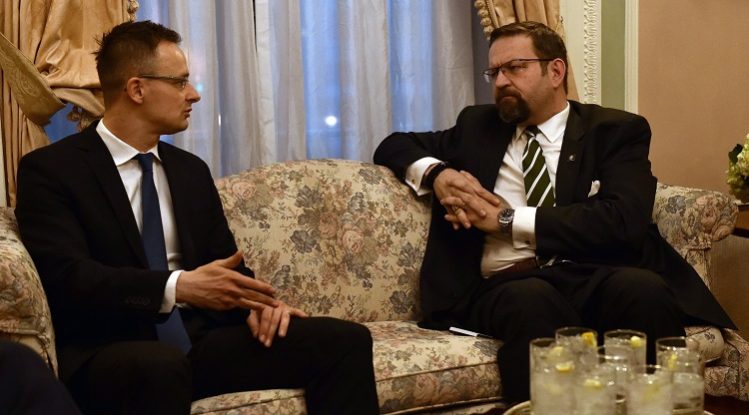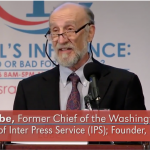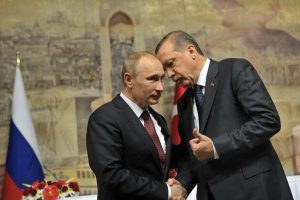by Jim Lobe
It was another not-so-good week for Sebastian Gorka. Trump’s top counter-terrorism aide has been under siege due to his past associations with far-right groups in Hungary as well as ongoing questions from well-recognized experts in the field about his actual counter-terrorism expertise and experience.
Gorka’s week began with renewed questions raised by an investigative article in The Forward about his actual relationship to Vitezi Rend. This “knighthood” was created by the ultra-nationalist and admitted anti-Semite Adm. Miklos Horthy, who ruled Hungary from 1920 to 1944 and allied Budapest with Nazi Germany until just before the end of the World War II. (LobeLog first raised the issue of his possible membership in the group in mid-February when it identified a medal worn by Gorka at an Inaugural ball as belonging to the order.) Although three senior officials of the Historical Vitezi Rend insisted to The Forward that Gorka and his father Pal were sworn members of the group, Gorka himself, after ignoring questions directed at him by LobeLog and The Forward, denied it unequivocally in an interview with Tablet magazine, then appeared to hedge somewhat in another interview with The Telegraph, and subsequently tried to ignore the issue altogether.
Indeed, since LobeLog first raised the issue, Gorka has not been seen sporting the Vitezi medal. He has repeatedly claimed that he wears the medal only to commemorate the sufferings of his family during the war and subsequently under the Communist regime that imprisoned and reportedly tortured his father for espionage between 1950 and 1956 when the family escaped to Britain during the 1956 uprising. Pal was awarded the medal in 1979, apparently by an exiled branch of Vitezi Rend, which had been declared illegal after the Communists took over in Hungary. The family returned to Hungary after the fall of the Communist government in the early 1990s when Gorka was in his early twenties. Although Gorka and his supporters have insisted that the medal was owned by his father, who died in 2003, it remains an open question, given the conflicting testimony, whether Gorka was also sworn in as a member of the order some time after the family’s return.
With those issues still hanging over him, Gorka also found himself this week the subject of a withering takedown by comedian Samantha Bee, who devoted a nearly eight-minute segment of her popular comedy/current affairs show on TBS, “Full Frontal.” His Fox-televised interview Thursday with Sean Hannity about the lethal attack by a 52-year-old London man on police and pedestrians near the British parliament also did not go down well as Trump’s chief counter-terrorism adviser insisted that the attack demonstrated why “executive orders like President Trump’s travel moratorium are so important.” A number of media outlets, including Salon and Mashable, pointed out the obvious: the pending moratorium, which would be applied to refugees and citizens of seven countries in the Middle East, would not have had the slightest effect if the British-born perpetrator had attempted to travel to the United States. As in other past instances, such as his defense of the controversial White House Holocaust Remembrance statement, which deliberately omitted any reference to Jews or anti-Semitism, Gorka came across as insensitive at best, both offensive and silly at worst, and always bombastic.
With the Hungarian Ambassador
But one of the most intriguing points of the past week came Tuesday at the formal opening of the new residence for the Hungarian ambassador to the United States, which was presided over by no less than Budapest’s minister of foreign affairs and trade, Peter Szijjarto. If ever there were an occasion for Gorka to wear his Vitezi medal in memory of his father’s sacrifices in particular, this was the moment. But, as you can see from the above photo, the administration’s most prominent official of Hungarian ancestry—and so proud of it—apparently decided against pinning it to his lapel.
Of course, Szijjarto represents the government of Prime Minister Viktor Orban who ruled Hungary from 1998 to 2002 and again since 2010. A self-proclaimed advocate of “illiberal democracy,” a Eurosceptic of the first order, and one of Europe’s strongest fans and friends of Russian President Vladimir Putin, Orban has emerged as the model for the populist, nationalist, and xenophobic movements that have taken center stage in the West’s politics. As Politico wrote last year, his political appeal “echoes the resentments of what were once the peasant and working classes” by promoting an “uncompromising defense of national sovereignty and a transparent distrust of Europe’s ruling establishments.”
It should come as no surprise whatever that, in his earlier political career, Gorka acted as an adviser to Orban and his Fidesz party, at various times between 1998 and 2006, according to a number of accounts. (Apparently unhappy with Orban’s failure to oust the Socialist government during prolonged street demonstrations and violence in the late 2006, Gorka tried, ultimately without success, to form a new party with two former militants of the even more right-wing Jobbik party.) Steve Bannon’s Breitbart website has for years also been an enthusiastic Orban booster, especially for his anti-immigration policies (just search Orban on the Breitbart website). Orban himself greeted Trump’s election with undisguised glee, proclaiming it “the end of liberal non-democracy” and an opportunity for “Western civilization… to break free from the confines of an ideology.”
Back to the reception at the new Hungarian residence. Gorka was not the only U.S. notable in attendance. Along with Hungarian Amb. Reka Szemerkeyi and Szijjarto, Iowa Rep. Steve King offered celebratory remarks, “stress[ing] that a strong bond must be forged and kept between the [sic] Hungary and the United States.” Yes, that’s the same Steve King who was denounced by his own Republican Congressional leadership for complaining that “we can’t restore our civilization with somebody else’s baby,” a remarkable echo of a controversial speech by Orban himself last November in which he warned that Europe “cannot build its future on immigration instead of families” and that “the survival of our civilisation and our culture is at stake.” (Interestingly, the Heritage Foundation, which is chaired by Thomas Saunders III, was scheduled to host a talk by Szijjarto Tuesday afternoon, but it was cancelled, apparently because the foreign minister’s plane arrived late. Saunders, who reportedly is related to the family of Gorka’s wife, endowed a chair occupied by Gorka from 2014 to 2016 at the Marine Corps University.)
Orban and Putin
According to an article by Gyorgy Lazar, “Sebastian Gorka—Orban’s Man in the Trump White House,”
suspected that he is providing unprecedented access for Hungarian diplomats to the White House. Hungary came to the rescue when questions were raised about Mr. Gorka’s relationships with Hungary’s far-right, anti-Semitic groups and it was suspected that he is a member of the pro-fascist Hungarian Vitézi Rend. Tibor Navracsics, an Orbán confidant, ex-deputy-prime-minister and currently the EU commissioner for Education, Culture, Youth and Sport defended Mr. Gorka in an article published by The Hill. Mr. Navracsics surprisingly described Gorka as the “man who has spent his life battling fascists and anti-Semites.”
Citing a Hungarian weekly, the article discloses that Amb. Szemerkenyi has met Trump three times since his election and held three meetings with Attorney General Jeff Sessions, who, as has been reported, has recused himself from investigations into Trump campaign contacts with Russian officials because of his failure to disclose his own meetings during his confirmation hearings with the Russian ambassador here.
“I don’t subscribe to conspiracy theories,” wrote Lazar, “but it wouldn’t surprise if it would turn out that Mr. Putin is behind the Ambassador’s frequent contacts with the Trump White House. Putin reportedly visited Hungary and Russian news outlets report that Mr. Orban is a potential ‘bridge’ between Presidents Trump and Putin.”
Of course, those contacts between Amb. Szemerkenyi and the White House may well run through Gorka, although he has been extremely critical of Putin in the past. In May 2016, when his wife was working for the Cruz campaign, Gorka noted that:
Putin is a former KGB colonel, he’s a thug, he’s a vicious man. He runs a country in which journalists get murdered if they disagree with the Kremlin. No Mr. Trump, we don’t and we should really stick to the friends we already have.
As CNN as pointed out, however, Gorka is nothing if not flexible. His tune had changed somewhat just last month when he told Breitbart after Trump publicly defended Putin,
The real answer is, we have a Commander-in-Chief who is incredibly pragmatic. You don’t get to be as successful a businessman as he is without being eminently pragmatic. And his attitude to how we’re going to get along with Russia is, ‘Look, we’d like to, but if we can’t, that’s also a reality.’ We’ve been very clear about that from the beginning.
Recall that just one year ago, Gorka attacked Trump as “full of bluster” with “no depth.” But, as a senior official in the Trump White House one year later, Gorka is filled with nothing but praise and total devotion to his new boss. Medal, shmedal: he’ll do whatever Bannon tells him to do, his dad’s memory be damned.
Photo of Sebastian Gorka and Peter Szijjarto courtesy of MTI






Clearly Gorka’s newfound caginess about his Vitezi Rend ties are a sign of someone playing anxious defense. Organized grassroots networks are complaining to their congressional representatives. Three Senators have also asked DOJ and DHS to investigate him to determine whether he lied on his citizenship papers. Gorka has changed his story on VR, recalling Flynngazi. All it takes now is for a Gorka rival or foe inside the WH to suggest to Trump that Gorka is a political liability and potential backstabber, while helpfully supplying the quote that Jim Lobe cited in this excellent piece of news analysis:
“Putin is a former KGB colonel, he’s a thug, he’s a vicious man. He runs a country in which journalists get murdered if they disagree with the Kremlin. No Mr. Trump, we don’t and we should really stick to the friends we already have.”
That sounds like a man who tried to discredit Trump without going so far as to call him a traitor. Trump may bristle at that as he did at Elliott Abrams’ critical remarks (when Trump was alerted to them) and, who knows? Where there’s one unflattering Gorka comment about Trump, there may be others…
PS. Just to add to the other Gorka quotes cited by Jim Lobe (“no depth”, “full of bluster”) Gorka also said:
“There’s no plan. There’s no strategy. So I can’t judge him because he’s really a black hole, so the last one that’s really serious is Senator Cruz.”
And more from CNN:
“The real estate mogul from New York is a lot of bluster, a lot of loud things to do with waterboarding, etc.” he said on “Let’s Talk with Mark Elfstrand”. “But I just don’t see the detail, I don’t see the mature plan.”
[Trump had previously come out in favor of waterboarding during the campaign, a technique that Gorka blasted in the interview as] “fundamentally un-American.”
“It’s not what we stand for and the idea that we make it part of policy, when you do that, you really start down a slippery slope and you start to close the gap between us and the bad guys,” [Gorka said, later adding that he considered waterboarding ineffective.]
“There were problems with that speech, Judge, especially when he [Trump] spoke about China and Russia and our potential friendship and our shared interests,” he told Jeanine Pirro. “We don’t have shared interests. I’m sorry. [Vladimir Putin] is a KGB colonel. This is the kind of guy who tortured people during the Cold War and wants to destroy us.”
Please don’t send Gorka back here to the UK. As it happens, Nick Griffin, the former head of the neonazi British National Party, announced the other day that he’d like to relocate to Hungary (presumably before the UK leaves the European Union, which would strand Griffin on these shores). I’m sure he and Gorka, with so much in common, could find a little pied à terre in one of the better suburbs of Budapest to share. And, if Nick does go, good luck with learning the local language!